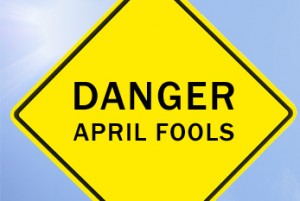The Gregorian Calendar
Some say that April Fools’ Day was first celebrated soon after the adoption of the Gregorian Calendar. Prior to that time, much of Europe celebrated March 25, the date of the Christian Feast of Annunciation, as the beginning of the new year. The celebration culminated on April 1 and was celebrated in much the same way as it is today with parties and dancing into the late hours of the night.
In 1563 King Charles IX decreed January 1 to be the first day of the year. Eighteen years later, in 1582, Pope Gregory XIII introduced the new Gregorian Calendar, and New Year’s Day was moved to January 1. Upon moving the official New Year’s Day from April 1 to January 1, there were some people who hadn’t heard or didn’t believe the change in the date, so they continued to celebrate New Year’s Day on April first. These people were called them “April fools” and often had tricks played on them. They were subject to ridicule, and were often sent on “fools errands” or were made the butt of other practical jokes.
Although this is a popular and widespread theory, it is not the only theory for the origin of the holiday, and many of the customs and traditions of the holiday were already well established prior to the calendar change. (http://www.calendar-updates.com/info/holidays/us/aprilfools.aspx)
But not everyone agrees:
Problems With This Explanation
There are at least two difficulties with this explanation. The first is that it doesn’t fully account for the spread of April Fools’ Day to other European countries. The Gregorian calendar was not adopted by England until 1752, for example, but April Fools’ Day was already well established there by that point. The second is that we have no direct historical evidence for this explanation, only conjecture, and that conjecture appears to have been made more recently.
Read more: April Fools’ Day: Origin and History | Infoplease.com http://www.infoplease.com/spot/aprilfools1.html#ixzz2PEVv4TJH
And others find this a better explanation
Spring Fever
It is worth noting that many different cultures have had days of foolishness around the start of April, give or take a couple of weeks. The Romans had a festival named Hilaria on March 25, rejoicing in the resurrection of Attis. The Hindu calendar has Holi, and the Jewish calendar has Purim. Perhaps there’s something about the time of year, with its turn from winter to spring, that lends itself to lighthearted celebrations.
Read more: April Fools’ Day: Origin and History | Infoplease.comhttp://www.infoplease.com/spot/aprilfools1.html#ixzz2PEWc1Gcr
Iranians play jokes on each other on the 13th day of the Persian new year (Nowruz) (now means new and ruz means day), which falls on April 1 or April 2. This day, celebrated as far back as 536 BC ,[11] is called Sizdah Bedar and is the oldest prank-tradition in the world still alive today; this fact has led many to believe that April Fools’ Day has its origins in this tradition
http://en.wikipedia.org/wiki/April_Fools’_Day
I found this all very interesting, such a time honored tradition and no one really knows exactly where it originated from. As to the question “Do we celebrate it?” I guess the answer would be “not really” and not because we have some great moral objection to the day, there is no religious meaning, or sinister overtones, it is just because we haven’t. I have friends who do very elaborate pranks on their families and I think it is great, I just don’t do it because I am lazy.
Although maybe this year is the time to start, and throw the whole family off as there are no expectations! What is your favorite April Fools Day prank?
|


I find it hard to muster the effort to play pranks. And I don’t enjoy being pranked so that may be the real reason I don’t celebrate it. 🙂
Telestial kingdom: “These are they who are liars, and sorcerers, and adulterers, and whoremongers, an whosoever LOVES and MAKES a lie. That’s my religious reason 🙂
I should be clear…the lying part scares me…but I’ve been known to make a joke or two, within reason, and if there isn’t deceit involved